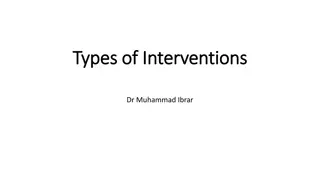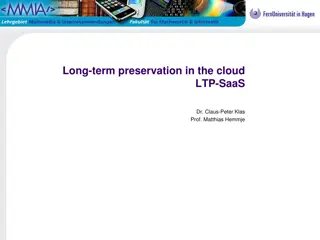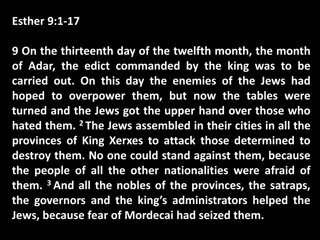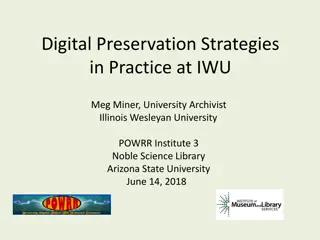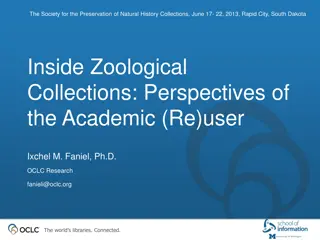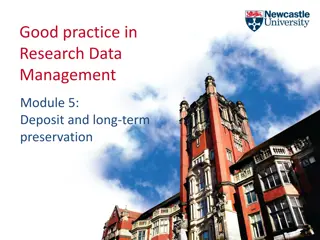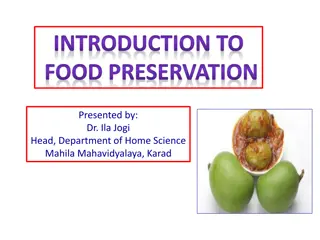An Overview of the Book of Esther: Providential Preservation and Brave Intervention
A detailed look at the Book of Esther, highlighting the setting, nature, and key events such as Esther becoming the queen of Persia, plots against Ahasuerus and the Jews, Esther bravely interceding while Haman plots, and the eventual victory and celebration of God's people. The story unfolds with intricate details of characters, schemes, and divine providence culminating in Mordecai's honor and the establishment of the Feast of Purim.
Download Presentation

Please find below an Image/Link to download the presentation.
The content on the website is provided AS IS for your information and personal use only. It may not be sold, licensed, or shared on other websites without obtaining consent from the author. Download presentation by click this link. If you encounter any issues during the download, it is possible that the publisher has removed the file from their server.
E N D
Presentation Transcript
The Bible Jesus Used A Gospel-Centered Glance at the Old Testament Bethlehem Baptist Church, fall 2014 Jason S. DeRouchie
Esther at a Glance Part 1: The Setting for the Providential Preservation of God s People Part 2: The Nature of the Providential Preservation of God s People Plots against the King and the Jews Esther Bravely Intercedes While Haman Plots The King Rewards Mordecai and Executes Haman Part 3: The Celebration of the Providential Preservation of God s People The Enemies of the Jews Are Defeated The Origin of the Feast of the Purim Epilogue: Mordecai Is Honored 1:1 2:18 2:19 7:10 2:19 3:15 4:1 5:14 6:1 7:10 8:1 9:32 9:1 9:19 9:20 32 10:1 3
The Setting (1:12:18) A king with only apparent authority (1:1 22).
The Setting (1:12:18) A king with only apparent authority (1:1 22). Ahasuerus greatness (1:1 9) Ahasuerus weakness and chance need for a queen (1:10 22)
A new queen of Persia (2:118) Get a queen! (2:1 4) Enter the main characters (2:5 7) The heroes intriguing heritage (2:5) The exilic context (2:6) The heroine (2:7) Esther s luck and her secret (2:8 18)
The Nature (2:197:10) Plots against Ahasuerus and the Jews (2:19 3:15) The king s chance deliverance (2:21 23) Enter the antagonist and his cruel plot (ch. 3) Haman s intriguing heritage and heinous plan (3:1 6). The destruction of the Jews decreed (3:7 15)
Esther bravely intercedes while Haman plots (4:1 5:14) The counter-offense initiated (4:1 17) Mourning and Mordecai s charge to Esther (4:1 14) Esth 4:14. For if you keep silent at this time, relief and deliverance will rise for the Jews from another place, but you and your father s house will perish. And who knows whether you have not come to the kingdom for such a time as this?
Esther bravely intercedes while Haman plots (4:1 5:14) The counter-offense initiated (4:1 17) Mourning and Mordecai s charge to Esther (4:1 14) Esther s God-dependent charge (4:15 17)
Esther bravely intercedes while Haman plots (4:1 5:14) The counter-offense initiated (4:1 17) The first feast and the rise of drama (5:1 8) Haman s gallows (5:9 14)
Ahasuerus Rewards Mordecai and Executes Haman (6:1 7:10) Unexpected humiliation (6:1 14) Unexpected honor (7:1 10) The second feast and the revealing of Haman s plot (7:1 6) The abating of Ahasuerus wrath (7:7 10)
The Celebration (chs. 89) The Enemies of the Jews Defeated (8:1 9:19) Mordecai s exaltation (8:1 2) The new counter-decree (8:3 17) The plea (8:3 8) Mordecai s authoritative declaration (8:9 14) The Jews joy (8:14 17) The great reversal and the seeds of kingdom hope (9:1 19)
The Establishment of Purim (9:2032) The call to keep an annual feast (9:20 28) Called Purim in recollection of Haman s casting of lots (9:24 26; cf. 3:7). A day of remembrance, joy, and giving to the poor (9:22). The command to keep Purim (9:29 32)
Epilogue (ch. 10) Mordecai is Honored (10:1 3)
The Lasting Message God s providential care is mysterious but real. By chance the orphan became queen. By chance Mordecai overheard the plot to assassinate the king and saved him. Haman relies on chance to determine when best to destroy the Jews, but the same timing ends up being their exaltation. By chance the king gave favor to Esther, which opened the door for her invitation to the feasts.
By chance the king read in his royal chronicles of Mordecai and decided to honor him. Ironically, Haman s passion to exalt himself resulted in Mordecai s exaltation. Ironically, Haman s plot to hang Mordecai resulted in his own hanging on the same gallows. Ironically, the king placed Mordecai over Haman s estate with all his authority. God s providential care is mysterious but real!
Everything happens with God-ordained purpose. Ahasuerus stands a foil to God who holds true sway in the universe. God was in charge of all: Vashti s removal, the choice of Esther as queen, Mordecai s discovery of the plot to kill the king and his not being rewarded so that Haman could later be humiliated, Esther s receiving the gold scepter, the king s sleepless night in which he discovers that he had failed to honor Mordecai, the elevation of Esther and Mordecai so as to deliver the Jews, etc.
For those who love God all things work together for good, for those who are called according to his purpose (Rom 8:28).
We should have hope in Gods power and faithfulness. God will preserve his own to the end. Esth 4:4. If you keep silent, relief and deliverance will rise for the Jews from another place, but you and your father s house will perish. And who knows whether you have not come to the kingdom for such a time as this.
God will curse those who curse his people (Gen 12:3; Num 24:9). Yahweh declared a war of judgment against the Amalekites (Exod 17:8 16; cf. Deut 25:17 19; 1 Sam 15:2). Saul, a Benjamite and son of Kish (1 Sam 9:1 2), failed to kill Agag, king of the Amalekites (1 Sam 15:8 9, 19 22). Haman was an Agagite (Esth 3:1, 10; 8:3, 5; 9:24), and Mordecai, a Benjamite and son of Kish (2:5), was the instrument of the Agagite s downfall both him and his family (7:10; 9:14). The Lord is both power and faithful, and he will continue to be.













